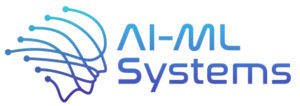Demo & Exhibits
Schedule
DATE: October 9–10, 2025
Venue: Indian Affairs
| Time | Event |
Day 1 & Day 2 – October 9, 2025 & October 10, 2025 | |
| 10:00 AM – 5:30 PM | #246: AI-Driven Data Governance: Real-Time Observability, Data Quality, and Compliance #252: Dermatica: A Mobile Solution for Preliminary Skin Disease Diagnosis #248: BizEye: Broad-spectrum Intelligent Zone Eye for Abnormality Detection #251: Ta Ka Di Mi: AI for Konnakkol and Rhythm Training #255: PolicyBot: Reliable Q&A over Policy Documents #254: GenSenSim: Generative Sensor Response Simulator #249: Machine Learning-Enhanced EKF for Vehicle Localization under Sparse Observations #244: AI-Driven Elephant Detection and Alert Systems for Human-Wildlife Conflict Mitigation Sprinklr Demo TCS Demo Walmart Demo IBM Demo Microsoft Demo |
The FIFTH INTERNATIONAL CONFERENCE ON AI-ML SYSTEMS invites demos from industry, academia, and startups showcasing cutting-edge technologies and their applications. AIML is a premier international conference dedicated to advances in Networking and Communication Systems.
AIML 2025 will be held in India (Bangalore, Karnataka), during 8–11 OCTOBER 2025.
All accepted demos will be published in the conference proceedings. Please consult the Demos & Exhibits chairs for any exceptions.
The use of artificial intelligence (AI)–generated text in an article shall be disclosed in the acknowledgments section of any paper submitted to an IEEE Conference or Periodical. The sections of the paper that use AI-generated text shall have a citation to the AI system used to generate the text.
- Submission deadline: 22nd August 2025, 29th August 2025, 11:59 pm AoE
- Notification of Acceptance: 5th September 2025, 12th September 2025, 11:59 pm AoE
- Camera-ready Deadline: 15th September 2025, 22nd September 2025, 11:59 pm AoE
- Gaurav Kumar Nayak, IIT Roorkee, India
- Subba Reddy Oota, TU Berlin, Germany
Topics of Interest
The areas of interest are broadly categorized into the following three streams: (including but not limited to)
- CPU/GPU architectures for AI-ML
- Specialized/Embedded hardware for AI-ML workloads
- Data intensive systems for efficient and distributed training
- Challenges in production deployment of AI-ML systems
- AI-ML programming models, languages, and abstractions
- AI-ML compilers and runtime
- Efficient systems for data preparation and processing
- Systems for visualization of data, models, and predictions
- Testing, debugging, and monitoring of AI-ML applications
- Cloud-computing for machine and deep learning
- Machine and deep learning “as-a-service”
- Tiny Machine Learning
- Embedded and Edge AI
- Pervasive AI
- Federated, distributed and parallel learning algorithms
- MLOps (data collection, monitoring and re-training)
- Efficient inference for deep learning models
- Logging mechanisms for deep learning models
- AI-ML for VLSI and architecture design
- AI-ML in compiler optimization
- AI-ML in data management – including database optimizations, virtualization, etc.
- AI-ML for networks – design of networks, load modeling, etc.
- AI-ML for power management – green computing, power models, etc.
- AI-ML for Cloud Computing
- AI-ML for IOT networks
- AI-ML for HPC
- Deep Learning Architecture and applications
- Computer Vision and Image processing
- Natural language processing and understanding
- Speech signal processing and Socio-Economic Systems
- AI-ML in cyber-physical systems
- Privacy, Security, and Robustness in AI-ML systems
- Ethics in AI-ML systems
- Fairness, Transparency, Interpretability and Explainability in AI-ML
- Sustainable AI-ML
- AI for Healthcare
- AI for Resource Allocation, Econometrics, and Finance
- AI for Energy
- AI for Transportation and Built Environment
- AI for Climate Change & Sustainability
- AI for Education
- AI for Art, Music, and Sound
Submission Guidelines
We invite the authors to submit their original work(s) in the following two categories:
- Research Demos: The authors are requested to submit an extended abstract no longer than three pages including all figures and references, describing the demo and any special requirements. The formatting must adhere to the Main Conference Guidelines. Submissions not adhering to the conference template will be rejected without review. Submissions must be in PDF format.
- Product & Startup Demos: The authors are requested to submit a proposal no longer than three pages that outline the motivation, technologies, and use cases that will be demoed.
- Submission links: https://cmt3.research.microsoft.com/AIMLSystems2025/Submission/Index
At least one author of an accepted demo is expected to register for the conference and present the demo in person.
Accepted Demo Track Paper
1. AI-Driven Elephant Detection and Alert Systems for Human-Wildlife Conflict Mitigation
Authors: Sinchana R L, Shruthi D V
2. AI-Driven Data Governance: A Framework for Real-Time Observability, Data Quality, and Compliance
Authors: Razak Abdul
3. BizEye: Broad-spectrum Intelligent Zone Eye for Abnormality Detection
Authors: Anupam Borthakur, Manoj Kumar Sharma, Debanjan Chattopadhyay, Kumar P Saha
4. Machine Learning-Enhanced EKF for Vehicle Localization under Sparse Observations
Authors: Adam Nabeel, Majeed Mohamed, Gopinath Selvaraj, Pappa M
5. Ta Ka Di Mi: AI for Konnakkol and Rhythm Training
Authors: Skanda Anantha Murthy, Mohith Velivela , and Balaji N K
6. Dermatica: A Mobile Solution for Preliminary Skin Disease Diagnosis
Authors: Sangavi V, Abishake S, Dhayal S R
7. GenSenSim: Generative Sensor Response Simulator
Authors: Anish Datta, Soma Bandyopadhyay, Subhasri Chatterjee, Tapas Chakravarty, Arpan Pal
8. PolicyBot: An Interactive Demo for Reliable Question Answering over Policy Documents
Authors: Gautam Nagarajan, Sudarsun Santhiappan, Omir Kumar


